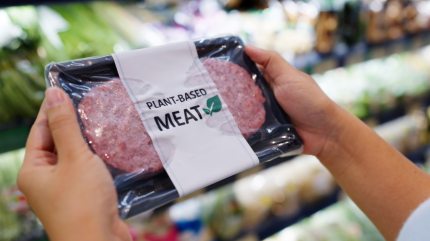
Demand for meat substitute products in Germany rose in 2023, with production growing 17% year on year, the country’s Federal Statistical Office said.
“Whether veggie burgers, tofu sausages or seitan mortadella – the demand for vegetarian or vegan meat substitute products continues to increase,” Destatis said.

Discover B2B Marketing That Performs
Combine business intelligence and editorial excellence to reach engaged professionals across 36 leading media platforms.
Data from Destatis showed that Germany produced approximately 121,600 tons of meat substitute products in 2023, which is a 16.6% increase on 2022.
The number of companies that manufactured faux meat products in Germany rose from 51 in 2022 to 67 in 2023.
In a five-year comparison to 2019, production more than doubled, the government body said.
Despite this increase, the value of meat substitutes is relatively low compared to meat products, said Destatis.

US Tariffs are shifting - will you react or anticipate?
Don’t let policy changes catch you off guard. Stay proactive with real-time data and expert analysis.
By GlobalDataIn 2023, the value of meat and meat products produced in Germany was €44.8bn, almost 80 times the value of meat substitute items and up 5.6% year on year.
The value of alt-meat products rose by 8.5% to €583.2m in 2023.
Neverthelesss, the difference between the value of meat products and alternative products has shrunk in the last five years.
In 2019, the value of meat products was €40.4bn in Germany, almost 150 times as high as the €0.3bn value of the mock meats.
In February, Destatis released preliminary figures showing meat production in Germany fell “significantly” in 2023.
The country’s meat production decreased 4% last year to 6.8m tonnes.
The “preliminary” figures meant “domestic meat production has fallen for the seventh year in a row since its peak in 2016 [of] 8.25m tonnes”, Destatis said.
Figures showed 47.9m pigs, cattle, sheep, goats and horses were processed last year. The data highlighted 702.2m chickens, turkeys and ducks were slaughtered.
Federal data on meat consumption in Germany in 2023 has yet to be published.
In 2022, the country saw a decline in per-capita meat consumption of 4.2kg to just under 52kg.
That represented a drop of almost 12% in five years compared to 2019 when people consumed an average of 58.5 kgs per capita.





